|
|
|
Sort Order |
|
|
|
Items / Page
|
|
|
|
|
|
|
| Srl | Item |
| 1 |
ID:
144296
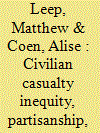

|
|
|
|
|
| Summary/Abstract |
Research into how civilian casualties influence public opinion largely focuses on citizens' support for the use of force by their own countries. This study explores how civilian casualties and partisan cues shape support for the use of force by an ally in a foreign conflict. Specifically, it assesses the effects of civilian casualty inequity – the uneven distribution of civilian casualties across two sides in a conflict – on Americans' support for Israel. Drawing on an original survey experiment conducted during the 2014 Israel–Gaza conflict, the article bridges work on inequity aversion theory, party identification, and social identity theory. It finds that civilian casualty inequity information reduces support for Israel, particularly among Independents. The study also finds that adding explicit partisan criticism cues to civilian casualty inequity information does not appear to induce motivated evaluations of Israel among Republicans or Democrats. An important implication is that under conditions of greater media coverage of civilian casualty inequity, Americans – particularly Independents – might become less supportive of Israel even in the absence of elite criticism of Israel.
|
|
|
|
|
|
|
|
|
|
|
|
|
|
|
|
| 2 |
ID:
193304
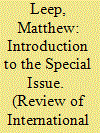

|
|
|
|
|
| Summary/Abstract |
The contributions to this Special Issue examine multispecies perspectives on the political dynamics of international life. Building on this theme, I consider the complex and manifold ways in which the subject of security can be understood in terms of more-than-human personhood. First, by thinking of more-than-human animals as phenomenally conscious persons, we might better appreciate the multispecies complexity of security as an agentic and affective experience. Second, attending to the spiritual character of certain indigenous articulations of personhood presses us to decipher how spiritual claims might inform moral and legal dimensions of multispecies security-seeking behaviour. To illustrate the significance of these moves, I first draw on more-than-human experiences of war, pathogenic viruses, and the global factory farm. I then explore conceptions of spiritual personhood in the context of Ojibwe responsibilities to protect wolves. These perspectives on personhood demonstrate possibilities for cultivating greater interest in the multispecies experience of security.
|
|
|
|
|
|
|
|
|
|
|
|
|
|
|
|
| 3 |
ID:
192199
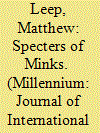

|
|
|
|
|
| Summary/Abstract |
While narrative approaches in International Relations (IR) have become increasingly prominent, posthumanist narratives of capitalism remain on the margins. Informed by feminist avant-garde poet Susan Howe and philosopher Jacques Derrida, I develop a ‘drift narrative’ approach to human-mink relations during the SARS-CoV-2 pandemic, wherein millions of minks in fur farms were infected by the coronavirus and culled. This approach employs the use of postcapitalist elegies constructed in a wildlife refuge located near a mink factory farm. In a context of global mink culls, the wildlife refuge – where minks live freely – proximate to a local industrial mink fur farm – where minks are caged and killed for profit – became the site of (re)writing IR in drift narrative form. This poetic analysis highlights trans-spatial links of animal capital and employs intermixed elegiac images, sound recordings, and textual fragments to help us become attuned to nonhuman dreams, desires, losses, and futures. Grounding persistence for postcapitalist futures within the dreams of the dead, the drift narrative generates a spectral form of global multispecies solidarity. Contributing to the interspecies and narrative turns in IR, as well as multidisciplinary work on multispecies solidarity, the drift narrative offers an aesthetic and ethical critique of past and future animal capital systems that render more-than-human life as killable.
|
|
|
|
|
|
|
|
|
|
|
|
|
|
|
|
| 4 |
ID:
161629
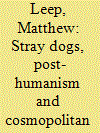

|
|
|
|
|
| Summary/Abstract |
International Relations scholars have recently begun exploring the politics of human-animal relations in global affairs. Building on Jacques Derrida’s work on hospitality and animals, this article theorises possibilities of responsibility to animals in war zones, pushing the limits of what it means to be with and for others regardless of their human or animal otherness. Specifically, I develop a critical account of cosmopolitan belongingness to illustrate how our being on earth is always a ‘being-with’ animal others. In thinking through possibilities of post-human belongingness that could emerge in times of war, cosmopolitanism becomes a futural task, an out-of-time and endless confrontation of past and future opportunities for interspecies togetherness. The theoretical significance of this approach is illustrated with a case study on the killing of stray dogs during the Iraq War. This case reveals a cosmopolitanism calibrated to more fully consider possibilities of human-animal belongingness amidst violence.
|
|
|
|
|
|
|
|
|
|
|
|
|
|
|
|
| 5 |
ID:
193308
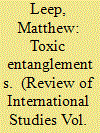

|
|
|
|
|
| Summary/Abstract |
This article explores avian experiences with toxic war processes that unfold across space and time. Joining together three evolving areas of interest in global politics – ontologies of war, interspecies relations, and sensory politics – the article develops a view of war that centres ongoing war processes that affect more-than-human life in and outside of international warzones. Advancing a multispecies form of inquiry attentive to local voices, including Upper Cook Inlet Tribes, the article examines how interspecies relations emerge in national security debates about long-lasting ecological costs of war. Specifically, it offers an analysis of US Department of Defense hearings surrounding the controversy over reopening Eagle River Flats – an Alaskan estuary that had been polluted with white phosphorus munitions – for weapons testing and training during the Iraq War. The article also considers the experiences of two migratory avian communities (northern pintails and tundra swans) with toxic white phosphorus pollution, illustrating more-than-human sensory perspectives on the space and time of war processes. These conceptual and empirical moves reposition national security concerns about wartime risk into a much broader post-anthropocentric perspective.
|
|
|
|
|
|
|
|
|
|
|
|
|
|
|
|
|
|
|
|
|